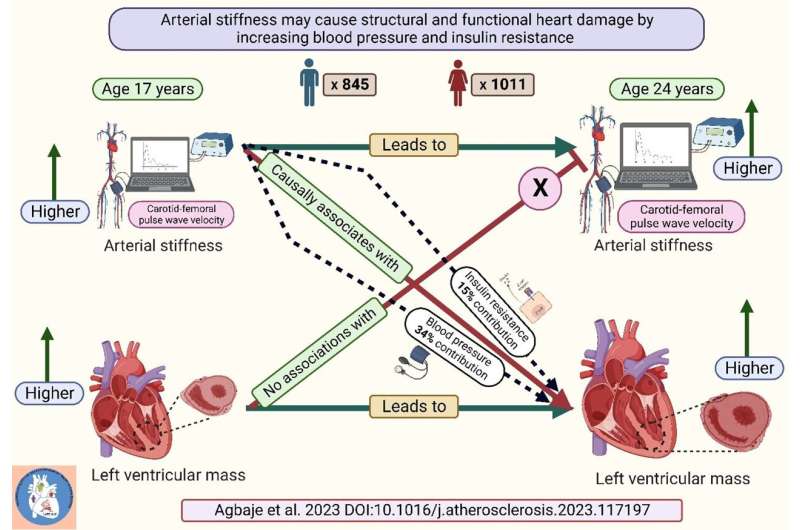This article has been reviewed according to Science X's editorial process and policies. Editors have highlighted the following attributes while ensuring the content's credibility:
fact-checked
trusted source
proofread
Arterial stiffness may cause and worsen heart damage among adolescents

Arterial stiffness is a novel cause of premature heart damage among adolescents, according to a new follow-up study. The study was conducted in collaboration between Texas Children's Hospital and Baylor College of Medicine in the U.S., the University of Bristol in the U.K., the University of Exeter in the U.K., and the University of Eastern Finland. The results were published in Atherosclerosis.
Left ventricular hypertrophy and left diastolic dysfunction are measures of structural and functional heart damage, which have been associated with an increased risk of cardiovascular-related death in adults. These cardiac measures are also used in the pediatric population as indicators of premature heart damage.
Arterial stiffness estimated from carotid–femoral pulse wave velocity has been discovered as a novel cause of increased blood pressure, insulin resistance, and metabolic syndrome in adolescents and young adults. It was also recently shown that increased blood pressure in adolescence may cause premature heart damage, but it is not known whether arterial stiffness could independently cause structural and functional damage to the heart.
The current study was conducted among 1,856 adolescents of whom 1,011 were female. The adolescents were 17 years old at baseline, and they were followed up for seven years until young adulthood at age 24. Arterial stiffness, carotid intima-media thickness, and evidence of heart damage were assessed at baseline and follow-up. Signs of heart structure damage are left ventricular hypertrophy and high relative wall thickness, whereas signs of heart function damage are left ventricular diastolic dysfunction and increased left ventricular filling pressure.
During the seven-year follow-up period, the prevalence of heart structural damage among adolescents doubled. With extensive control for fat mass, muscle mass, glucose, insulin, blood pressure, lipids, smoking status, sedentary time, physical activity, socio-economic status, and family history of cardiovascular disease, and using adults' cut points for diagnosing heart damage, it was observed that adolescents in the highest tertial category of arterial stiffness and carotid intima-media thickness had a 23%–27% increased risk of progressively worsening structural heart damage.
Only arterial stiffness appears to independently cause both structural and functional heart damage, whereas increased carotid wall thickness does not seem to have a causal role. Increased carotid wall thickness is an early indicator of atherosclerosis, whereas increased arterial stiffness describes arteriosclerosis. The study further reported that arterial stiffness caused heart damage by increasing blood pressure and insulin resistance. The increase in blood pressure explained 34% of the heart damage caused by arterial stiffness. Moreover, insulin resistance explained 15% of the heart damage caused by arterial stiffness.
"We are seeing for the first time that arterial stiffness is a novel cause of several diseases such as hypertension, insulin resistance, metabolic syndrome, and heart damage in the young population. Among adults, arterial stiffness is currently being established as a cause of type 2 diabetes. We discovered that approximately 50% of the deleterious role of arterial stiffness in causing heart damage is enhanced by the mechanism of increased blood pressure and insulin resistance.
"Thus, preventing and lowering blood pressure and insulin resistance may potentially diminish the negative impact of arterial stiffness on the heart, by up to half," says Andrew Agbaje, a physician and clinical epidemiologist at the University of Eastern Finland.
"Experimental and clinical intervention studies are urgently needed on comprehensive approaches to treating and reversing arterial stiffness from adolescence. At least, targeting blood pressure and insulin resistance leaves the problem half-solved."
More information: Andrew O. Agbaje et al, Arterial stiffness but not carotid intima-media thickness progression precedes premature structural and functional cardiac damage in youth: A 7-year temporal and mediation longitudinal study, Atherosclerosis (2023). DOI: 10.1016/j.atherosclerosis.2023.117197





















